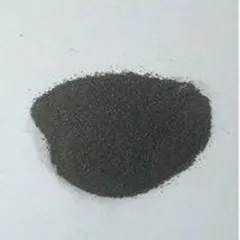- Home
- Products
- Elementary
- Boride Powder
- 3D Printing Powder
- Sulfide Powder
- Oxide Powder
- Carbide powder
- Nitride Powder
- Silicide Powder
- Hydride Powder
- Telluride Powder
- Selenide Powder
- Stearic Acid Series
- Phosphide Powder
- Nanoparticles
- Metal Alloy
- MAX Phase
- Lithium Battery Anode
- Surfactant
- Molecular sieves
- Concrete Admixtures
- Cladding of metals
- News
- Blog
- Contact
- About
High Purity Nickel Ni powder CAS 7440-02-0, 99%
Overview of Nickel powder :
Nickel powder is silver-white and has a metallic luster. Depending on the specific preparation process, its shape can be spherical, cube, diamond, etc.. The particle size of the nickel powder can be adjusted according to the application requirements. Generally, the finer the particle size, the larger the specific surface area, and the better the physical and chemical properties of nickel powder. The density of nickel powder is about 7.8g/cm3. Porosity refers to the percentage of porosity in the total volume of nickel powder, affecting the hygroscopicity, electrical conductivity, and plasticity. Nickel powder has high stability to air, water, alkali, and other substances at room temperature. It is not easily oxidized or chemically reactive with these substances. Nickel has good corrosion resistance and is not easily affected by the atmosphere and certain chemicals. It is resistant to sulfuric acid., nitric acid, hydrochloric acid, and other acids. Nickel powder is magnetic and can be attracted by magnets. This characteristic makes the nickel powder have special uses in special applications, such as magnetic recording, electromagnetic shielding, etc. In catalyst preparation, nickel powder is often used as a catalyst carrier or active component, showing good catalytic activity.

Features of Nickel powder :
Low cost, high conductivity, small electromobility, excellent corrosion resistance and heat resistance to solder, while sintering temperature is also high.
The high-temperature co-firing with ceramic dielectric materials is good, so it is widely used in the internal electrodes of multi-layer ceramic capacitors (MLCC). Replacing precious metals such as palladium-silver alloys or pure metal palladium with nickel powder can significantly reduce costs.
In coatings and plastics, nickel powder can be used as a conductive pigment for shielding electromagnetic stems involving RF interference. At the same time, it can also be used to make a variety of high-gloss decorative paints and plastics and can even replace aluminum powder as an anti-corrosion paint in water-based systems.
Nickel powder plays an important role, especially in aircraft, radar, and other military and civil machinery industries.
Nickel powder can also be used to make diamond matrix powder, which can improve the density of the tissue and the degree of alloying of the matrix, reduce the sintering temperature, enhance the self-sharpness of the matrix, and thus improve the tool's sharpness.
Advantages of Nickel powder :
Excellent physical properties: Nickel powder has high electrical conductivity, low electromobility, and excellent corrosion and heat resistance. These properties make nickel powder widely used in electronics, especially in the internal electrodes of multi-layer ceramic capacitors (MLCCS). In addition, the high sintering temperature of nickel powder and the good high-temperature co-firing with ceramic dielectric materials further enhance its advantages in manufacturing electronic components.
Wide range of applications: nickel powder is not only widely used in electronics but also plays an important role in many fields, such as batteries, aerospace, and diamond tools. In the field of batteries, nickel powder as a positive electrode material can provide high energy density and power density, while its excellent high-temperature and corrosion resistance also improve the safety and stability of the battery. In aerospace, nickel powder can manufacture superalloys and special steels to provide higher strength and high-temperature resistance for aircraft and rockets.
Environmental advantages: Nickel powder has environmental advantages in some applications. For example, in coatings and plastics, nickel powder can be used as a conductive pigment to shield electromagnetic interference and radio frequency interference, thereby reducing environmental pollution.
Application of Nickel powder :
Battery Manufacturing:
Nickel powder is a very important raw material in battery manufacturing. It makes positive electrode materials for batteries, such as nickel-cadmium and nickel-metal hydride batteries. Nickel powder has high energy density, good electrochemical performance, and durability, which can improve the energy density and life of the battery.
Catalyst preparation:
Nickel powder is a common catalyst carrier used to prepare a range of catalysts. These catalysts are commonly used in oil cracking, ammonia synthesis, hydrogen production, and other industrial production. Nickel powder as a catalyst carrier can provide high surface area and good mass transfer performance, thus improving catalyst activity and selectivity.
Superalloy:
Nickel powder is an important alloying element in superalloys, which can improve alloys' strength, corrosion resistance, and high-temperature stability. Nickel powder can also be used to prepare certain single-crystal superalloys, which have excellent high-temperature properties and can be used in high-temperature applications such as aircraft engines and rockets.
Cosmetics:
Nickel powder is commonly used as a colorant and filler in cosmetics. It can provide cosmetic products with beautiful color and texture while enhancing cosmetics' moisturizing and nourishing effects.
Magnetic material:
Nickel powder has magnetic properties and can be used to prepare magnetic materials. These magnetic materials can manufacture magnetic storage devices such as tapes, disks, recorders, electromagnetic shielding, heating, and other applications.
Wear-resistant coating:
Nickel powder can be used to prepare wear-resistant coatings with high hardness and good wear resistance and can manufacture wear-resistant parts and structural parts.
Cermet:
Nickel powder can be used for the preparation of cermet materials. Cermet is a new type of material that combines the advantages of metal and ceramic materials and has high strength, hardness, wear resistance, and high-temperature resistance. As one of the raw materials of cermet, nickel powder can improve the material's mechanical properties and wear resistance.

Company Profile:
Synthetic Chemical is a trusted global chemical material supplier & manufacturer with over 12 years of experience providing super high-quality chemicals and nanomaterials, including boride powder, nitride powder, graphite powder, sulfide powder, 3D printing powder, etc.
The company has a professional technical department and Quality Supervision Department, a well-equipped laboratory with advanced testing equipment, and an after-sales customer service center.
If you are looking for high-quality Nickel powder , please feel free to contact us or click on the needed products to send an inquiry.
Payment Term:
L/C, T/T, Western Union, Paypal, Credit Card etc.
Shipment Term:
By sea, by air, by express, as customers request.

Storage Conditions:
1) Store in a dry environment at room temperature.
2) Avoid damp and high temperatures.
3) Use immediately after opening the inner packing bag.
FAQ:
Q1:
Physical properties of nickel powder?
Nickel powder is a gray, irregular powder with high electrical conductivity and low electromobility. Nickel powder is easy to oxidize in humid air, and the surface will form a black oxide film, preventing further oxidation and playing a role in corrosion protection. In addition, nickel powder has a high melting point and hardness, can be highly polished, and is abundant in the Earth's crust.
Q2:
Chemical properties of nickel powder?
Nickel powder is an active metal with good chemical stability. It can chemically react with many elements to form various compounds. Nickel powder can be used as a hydrogenation catalyst in chemical reactions to promote the progress of some organic chemical reactions. In addition, nickel powder can also form compounds with oxygen, sulfur, arsenic, and other elements, which have a wide range of applications in industry.
Q3:
What is the application of nickel powder in the electronics industry?
Conductive materials: Nickel powder can be used as a functional conductive filler, added to coatings, adhesives, inks, plastics, and rubber to make conductive, electromagnetic shielding, and anti-static products. These products are widely used in electronics, mechanical and electrical, communications, printing, aerospace and weapons, and other industrial sectors, such as computers, mobile phones, electronic medical equipment, electronic instruments, and other electronic, electrical, and communication products, electromagnetic shielding, and anti-static.
Electroplating base treatment: Nickel powder is used as a base treatment material in the electroplating industry, which can improve the adhesion, uniformity, and corrosion resistance of the coating.
Battery material: Nickel powder is also used as a battery material, especially as an electrode material in nickel-metal hydride batteries, providing high energy density and good cycling performance.
Q4:
What is the difference between spherical nickel powder and water-atomized nickel powder?
Morphology: spherical nickel powder has a regular spherical or nearly spherical structure, smooth surface, and uniform particle size. The morphology of water-atomized nickel powder is irregular; the particle size and shape are different, and the spherical nickel powder does not have a uniform morphology.
Purity: Spherical nickel powder has high purity and low impurity content, suitable for high purity requirements of the occasion. The purity of water-atomized nickel powder is relatively low and may contain more impurities.
Application field: Because the spherical nickel powder has regular morphology and high purity, it is more suitable for high-purity and high-precision applications, such as metal 3D printing, laser cladding, and battery cathode materials. Due to its irregular shape and low purity, the water-atomized nickel powder is usually suitable for general industrial fields, such as coatings and plastics.
Q5:
What is the difference between spherical nickel powder and water-atomized nickel powder?
Specific surface area: Water-atomized nickel powder has a large specific surface area, making it more surface active and easier to react with other substances. The specific surface area of spherical nickel powder is relatively small, and its surface activity is relatively low.
Porosity: Water-atomized nickel powder has a high porosity, which helps to improve its adsorption and catalytic properties. The spherical nickel powder has lower porosity and does not have the same adsorption and catalytic advantages.
Electrical properties: Spherical nickel powder has high electrical conductivity and low electrical mobility, making it widely used in electronics. The electrical properties of water-atomized nickel powder may vary depending on the preparation process and particle morphology, but it usually has good electrical conductivity.
Nickel Ni Powder Properties | |
| Other Titles | Nickel particles, Nickel microparticles, Nickel micropowder, Nickel micro powder, Nickel micron powder, Nickel submicron powder, Nickel sub-micron powder. |
| 7440-02-0 | |
| Compound Formula | Ni |
| Molecular Weight | 58.69 |
| Appearance | Unstable gray powder that is easily oxidized in humid conditions. |
| Melting Point | 1455 degC |
| Solubility In Water | N/A |
| Density | 8.902 g/cm3 |
| Purity | N/A |
| Particle Size | N/A |
| Boling Point | 2732 degC |
| Specific Heat | 0.44 kJ/kg*K |
| Thermo Conductivity | 90.9 W*m-1*K-1 |
| Thermal Expansion | 13.4 um*m-1*K-1 (25 degC) |
| Young's Module | 200 GPa |
| Exact Mass | N/A |
| Monoisotopic | N/A |
Nickel Ni powder Safety & Health Information | |
| Safety Notice | Danger |
| Hazard Statements | H228-H317-H351-H372 |
| Flashing Point | Non applicable |
| Hazard Codes | N/A |
| Risk Codes | N/A |
| Safety statements | N/A |
| RTECS # | N/A |
| Transport Information | UN3089 – class 4.1, PG 2 and EHS. Metal powders, flammable, non-toxic, Hi.A., S |
| Germany | 2 |
Inquiry us
PREVIOUS Elementary
High Purity Bismuth Bi powder cas 7440-69-9, 99%
NEXT Elementary